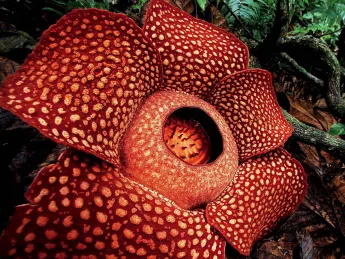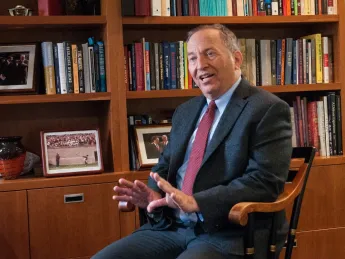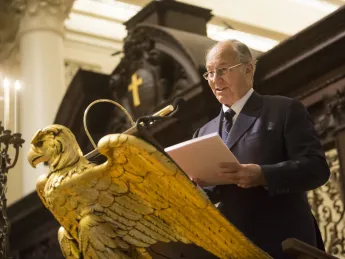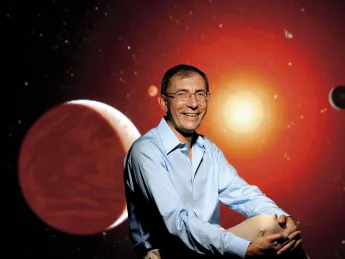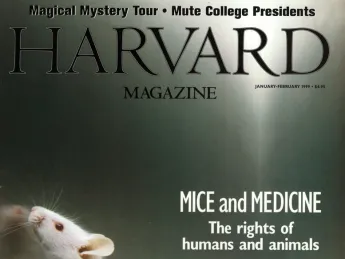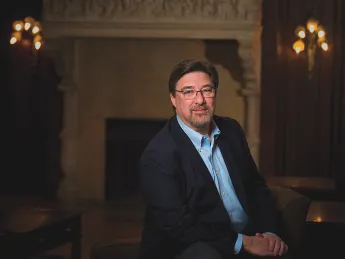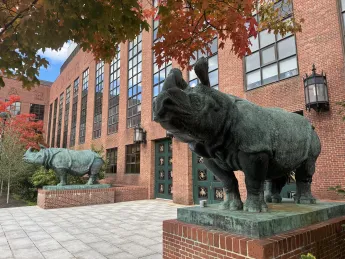Search
Colossal Blossom
The largest flower in the world, Rafflesia arnoldii, is more than three feet across. With no roots, shoots, stems, or leaves, this parasitic plant is stealthy, visually undetectable until it prepares to bloom. Buds erupt without warning from an infected …
Issue: March-April 2017
Larry Summers Reflects
In the decade since Lawrence H. Summers departed Massachusetts Hall, the former Harvard president, now Eliot University Professor, took a sabbatical; resumed teaching; joined President Barack Obama’s administration to help secure recovery from the …
Stem-cell Science
Portraits by Stu Rosner The next time you look in a mirror, reflect on this: the face staring back at you is literally not the same one you saw two months ago. Your skin is constantly renewing itself. Like most specialized cells in your body, skin cells …
Issue: July-August 2004
The Harvard Remarks of the Aga Khan
During his Jodidi Lecture at Harvard’s Memorial Church, co-sponsored by the Weatherhead Center for International Affairs and the Prince Alwaleed Islamic Studies Program, on November 12, His Highness the Aga Khan, Imam of the Shia Ismaili Muslims (and a …
The Road to Romance
"I'm at that age where I'm crossing the threshold from high-school-fantasy concepts of romance to the brutal, painful, hopeless world of adult dating." ~ Sophia Chang '01 SEE ALSO • "I don't want to be stereotyped." • "We tend to …
Issue: March-April 2003
Medicine by Model
It's a troubling area, the economics of saving lives. Take cervical cancer, for example. In the United States we have spent enormous sums for the prevention and treatment of the disease and have even—unlike the case with most cancers—learned …
Issue: July-August 2002
Life’s Beginnings
Are the inhabitants of Earth the only life forms in the universe, or could life exist elsewhere? As astronomers rapidly identify exoplanets—those beyond our solar system—the question has been transformed from a science-fiction trope to one discussed in …
Issue: September-October 2013
From the Archives: Animal Research
The volume of biomedical research, and of trials of new therapies, has increased dramatically in recent decades, fueled by advances in understanding of the genome and how to manipulate it, methods of processing huge data sets, and fundamental discoveries …
Tackling Teaching and Learning
For the third time in a decade, the Faculty of Arts and Sciences (FAS) is addressing its educational mission. During the December 7 faculty meeting, dean Michael D. Smith talked at length about “teaching and learning,” initiating both a website dedicated …
Issue: March-April 2011
The Economic Agenda
I have been privileged to watch the 10 previous presidential elections closely. In the course of each of them, it was said that this was a uniquely important presidential election—that the country was at a turning point, that the decisions that were going …
Issue: September-October 2008
India's Promise
Things have never been as good for India as they appear to be today. Its economy has grown by nearly 6 percent annually for the past quarter-century—virtually unprecedented for any sizable democratic polity. In contrast to the near-famine conditions …
Issue: July-August 2005
Brevia
Vanishing Visas Post-9/11 delays in granting visas for foreign nationals intending to study in the United States have begun to inhibit the flow of talent to universities, particularly in the sciences. Applications are down by 10 percent or more at most of …
Issue: July-August 2004
A Nation, Building
On a recent Monday morning, during a class on global trade, the professor reviewed the effects of nations’ limits on such commerce: tariffs, quotas, and the “voluntary” restraints exporting countries impose on their shipments to eager customers (lest …
Issue: May-June 2014
The Mirage of Knowledge
Several years ago , Tom Nichols started writing a book about ignorance and unreason in American public discourse—and then he watched it come to life all around him, in ways starker than he had imagined. A political scientist who has taught for more than a …
Issue: March-April 2018
Harvard’s Nobel Prize Incubator
A striking phenomenon in the biomedical sciences is that great scientists sometimes arise in clusters at a particular time and place that fosters outstanding scientific achievement. Certain institutions, indeed certain places within institutions, succeed …
